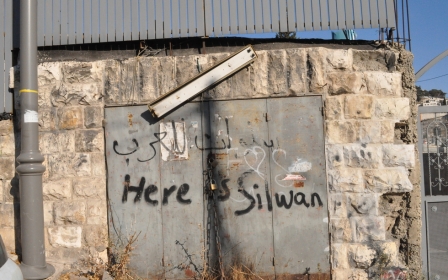Far-right Israeli minister 'revived E1 plans without approval'

Israel government officials have said that new plans for settler homes in one of the most contentious areas of the occupied West Bank were commissioned without authorisation and have no validity.
A statement on Tuesday in the name of "officials" at the office of Prime Minister Benjamin Netanyahu said a move to revive and extend plans for construction in the zone east of Jerusalem known as E1, was launched during his previous government by then housing minister Uri Ariel, of the far-right Jewish Home party.
"He did so of his own initiative and without the required authorisation," the statement said. "The ministry of housing has no authority either to plan or build beyond the Green Line," which separates Israel from the West Bank.
"These plans therefore have no standing and are not binding on anyone," it added.
Ariel, himself a resident of Kfar Adumin settlement, northeast of E1, is now agriculture minister.
Israeli settlement watchdog Peace Now said Monday that the housing ministry was seeking to build 55,548 units in the West Bank - including two new settlements - of which more than 8,300 homes would be in E1.
Tuesday's statement referred specifically to Ariel's "theoretical plans for development in E1" and did not mention the broader project.
E1 and the adjacent Maaleh Adumim settlement form an Israeli buffer east of Jerusalem that the Palestinians say would divide the West Bank and badly hurt the possibility of a contiguous Palestinian state.
"For these reasons, whenever an Israeli leader tries to promote the plans in E1, the international community strongly condemns them," Peace Now wrote.
The United States, the United Nations and the European Union oppose all Israeli settlement building but have voiced particular concern about plans for E1.
In 2013, faced with international pressure, Netanyahu vetoed construction of some 1,200 homes there but Peace Now said the housing ministry had hired architects to prepare fresh blueprints.
US-backed peace talks between the Palestinians and Israel collapsed in April 2014 amid bitter mutual recriminations.
A chief grievance of the Palestinians was settlement building on land they claim for a future state.
Israel seized the West Bank and east Jerusalem in the 1967 Six-Day War. It later annexed east Jerusalem in a move never recognised by the international community.
Today, some 380,000 Israelis live in 135 West Bank settlements, with another 200,000 in East Jerusalem.
Stay informed with MEE's newsletters
Sign up to get the latest alerts, insights and analysis, starting with Turkey Unpacked
Middle East Eye delivers independent and unrivalled coverage and analysis of the Middle East, North Africa and beyond. To learn more about republishing this content and the associated fees, please fill out this form. More about MEE can be found here.




